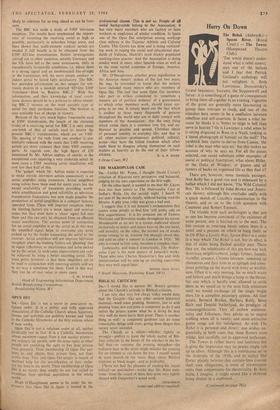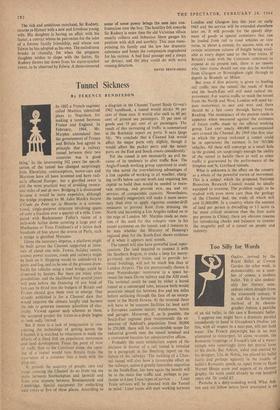Hurry On Down
The Rebel. (Aldwych.)— Spoon River. (Royal Court.) — The Tower.
(Hampstead Theatre Club.)
'THE world doesn't under- stand what a rebel means,' says one of the ballads and I fear that Patrick Garland's anthology will not enlighten it. Both Lawrences, Dostoievsky's Grand Inquisitor, Socrates, the Steppenwolf and Satan: it is something of a game of consequences to bring them all together in an evening. Vignettes of the great are generally more fascinating' as gossip than relevant as truth, and one of the mistakes here seems to be a confusion between rebellion and self-assertion. Is Satan a rebel be- cause he thinks it is 'better to reign in hell than serve in heaven'? Or is Lawrence a rebel when he is sitting disguised as Ross in a Naafi, looking at a tinted photograph of himself on the wall? The yardstick here claims to derive from Camus, 'the rebel is the man who says no,' but this makes no account of why he says no. For all the pieces selected, one could substitute other examples of social or political frustration; what about Hitler, or the Duke of Windsor, or gipsies and all turners of backs on organised life as they find it?
There are, however, some thematic passages. Ned Kelly has a good run and is enhanced by a ballad which 1 did not know, 'The Wild Colonial Boy.' He is followed by John Brown and Ameri- can slavery, although this concludes oddly with a quick sketch of Lincoln's assassination in the theatre, and so on to the Irish question with Casement and Robert Emmett.
The trouble with such anthologies is that just as one has become convinced of the existence of some person, one is hurried on to the next. The bits remain as unstrung beads unless there is a motif and a passion on which to hang them, as in Oh What a Lovely War. Spoon River is a unity in a way which The Rebel is not, but its effect is that of slides being flashed quickly past. There they are, the inhabitants of this pre-first-war hick American neighbourhood, judge, farmer, lunatic, traveller, arsonist, Chinese labourer, summing up themselves and their lives in an epitaph and some- times pointing up the moral with irony or wistful- ness. Often it is very moving, for so much waste and failure and death brings a lump to the throat, but one which is hardly ever allowed to settle there as we speed on to the next little miniature until we would exchange all the single bright stars for a complete planetary system. All four actors, Bernard Braden, Barbara Kelly, Betsy Blair and Donald Sutherland, do prodigies of transmogrification. They all eschew sentimen- tality and folksiness, they advise us to expect nothing when all is vanity, and some attractive guitar songs ask for indulgence. As with The Rebel it is personal and direct: one wishes un- gratefully in both cases that these flowers were wilder, less carefully cut in approved hothouses.
The Tower is rather heavy and lustreless but it gives the impression that its pewter might rub up to silver. Although this is a melodrama set in the Australia of the 1850s, and its author Hal Porter plainly believes that curtain-lines contain their own obligations,' a, sense of involvement more than compensates for theatricality. In Aus- tralia, I imagine, it might sound like a skeleton being shaken in a cupboard.
(Continued on page 282) mere job of punctilious period reconstruction. They have taken Romantic literature's unattain- able she and attempted to give her contemporary validity, and despite the fact that, unlike Peter Pan, we not only no longer believe in fairies, we no longer even believe in them as a legitimate literary conceit, it seems to work surprisingly well. It might brutally be suggested that any- thing too silly to be said can be sung, and any- thing too silly to be sung can be danced, yet be- hind such a suggestion lies a great deal of sense.
WE hear a lot about the big new Mahlerian bat- talions. They showed their zeal for the Muster by staying away from his
Staying Away from the Master
By CHARLES REID



































 Previous page
Previous page